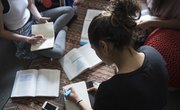When have limited time to prepare for a test, but you're tired, studying can seem like a hopeless endeavor. However, maximizing your exposure to the material is crucial to achieving a high score. You can keep studying when you're tired and even increase your knowledge if you take care of your body and keep your brain alert.
Prepare Yourself and Your Environment
Eat before studying if you are hungry. Hunger can distract you and keep you from retaining what you study. Tell roommates or family members that you are studying. Ask them not to disturb you for any reason. Eliminate distractions. Turn off the TV, your cell phone and music. Your study material should be the only thing going into your brain.
Plan Your Study Session
Determine the purpose of your studying. Are you preparing for a test, a class discussion or a tutoring session? Decide what's most important for you to learn. Consult your study guide or past tests to determine what your teacher is likely to focus on. Should you place emphasis on vocabulary, on key dates or on being able to critically analyze the material? When you're tired, you cannot retain as much information. Choose the most important stuff. Break the material into manageable parts. Alternate between easy tasks, such as making flash cards, and those that require concentration. Changing it up helps the material seem fresh. Plan to switch gears regularly to avoid burnout on one particular component.
Stay Alert
Keep plenty of water on hand. Staying hydrated keeps your brain and body working at optimum levels and give you a regular reason to get up and move around. Chew strong-flavored gum. The regular motion of your jaw and the gum's flavor keeps you from becoming sleepy too easily. Move around. Sit at your desk, then move to the floor, then to an armchair or couch. If you have flashcards, walk around while you go through them. Take a cold shower if you feel yourself getting too tired. The water helps wake you up and being clean helps you feel refreshed and ready to start anew.
Tip
Don't study past the point that it's obvious you can learn no more. Listen to your body. A good night's sleep is better than an all-night cramming session.
Warning
Depriving your body of sleep can result in lowered immune system functionality and keep you from being able to perform to your potential. Don't push your body too hard or you could damage your health.
Related Articles
References
Tips
- Don't study past the point that it's obvious you can learn no more. Listen to your body. A good night's sleep is better than an all-night cramming session.
Warnings
- Depriving your body of sleep can result in lowered immune system functionality and keep you from being able to perform to your potential. Don't push your body too hard or you could damage your health.
Writer Bio
Kate Bradley began writing professionally in 2007. She holds a Bachelor of Arts in international studies and a minor in German from Berry College in Rome, Ga; TEFL/TESOL certification from ITC International in Prague; and a Master of Arts in integrated global communication from Kennesaw State University in Kennesaw, Ga.











